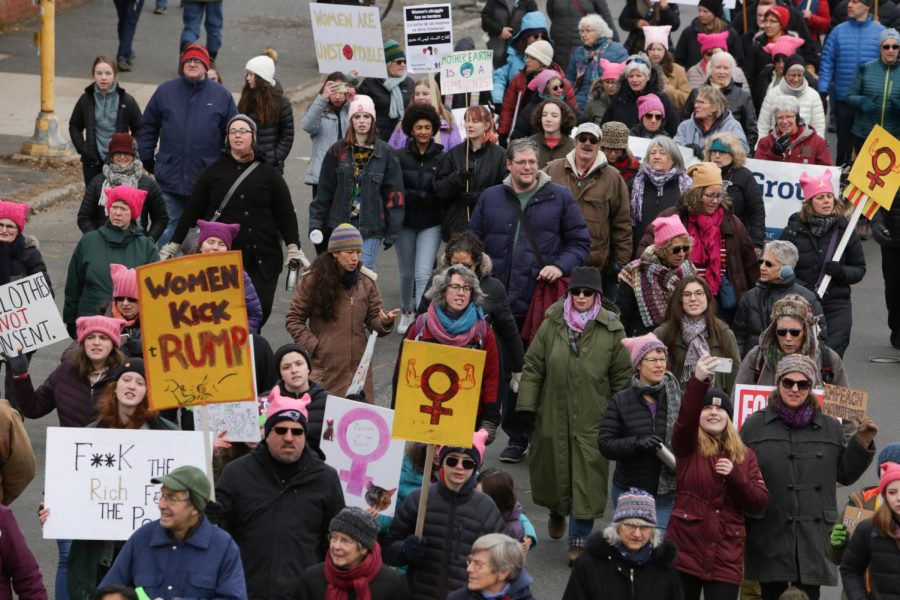Setting my alarm for 4:45 a.m. on a Saturday morning is usually the last thing I’d want to do, but on the eve of Jan. 19, I was eager to do so. The next morning, a few friends and I would be catching the train into Boston for this year’s Women’s March. We had prepared homemade signs for the event – some funny, some serious – addressing issues from wealth distribution to sexual assault rates in the United States.
As we set out that morning, I felt excited. I’ve considered myself a feminist since before I even knew the word. It was my first political rally, and I was taking it on with some of my best friends by my side. We were anticipating a day full of positivity and support for equality, and on the surface, that’s what it felt like. My friends and I enjoyed the day despite the cold, and as we boarded the train home, I felt happy, hopeful, and inspired.
But I was left with a strange aftertaste.
The more I thought about it, the more I felt that the activism at the Women’s March was lukewarm. A lot of the protest signs I saw were less focused on activism and more focused on humor or less-serious topics. I am guilty of this too: my sign said “Krusty Krab Unfair.” The frivolity of some of the posters took away from the overall seriousness of the event and highlighted a real problem with these kinds of marches. There just isn’t enough passion behind them. Many of the speakers failed to captivate the large crowd gathered on the Boston Common during the three total hours of speeches. The most excitement came from the back-and-forth between the marchers and the pro-border wall protesters who showed up. Keynote speaker and newly elected Congresswoman Ayanna Pressley managed to re-energize the crowd before the actual march began, but overall the masses felt kind of apathetic. Granted, this could be attributed to the freezing cold temperatures or the impending threat of the incoming winter storm, but something just felt off.
The first Women’s March was organized in January 2017 and holds the title of the largest single-day protestin American history. Two years ago, the crowds were angrier, driven by the sexist remarks and actions of the newly inaugurated 45th President. Now, the people who turn out to these marches seem less enthusiastic, less angry, less progressive and not to mention fewer in numbers. Support for the national Women’s March suffered due to accusations of anti-Semitism, but the national march is not associated with the smaller marches, and the Boston march went so far as to publish an op-ed decrying the national march.
So why did the mood shift? What happened to the Women’s March?
The issue may not entirely be lack of motivation. There were plenty of marchers I saw who were enthused about the work which they were doing. The change may be, somewhat ironically, the result of a more diverse crowd of people partaking in the protest. Dana R. Fisher, a professor of sociology at the University of Maryland, pointed out that many of the newcomers to the protest were likely to be moderates, as opposed to the usual crowd of far-left progressives. At the Washington D.C. march, it was reported that a group of Republican women joined the marchers on the route. So fewer people are attending the march (an estimated few thousand in 2019 as opposed to the estimated 5,246,670 within the United States in 2017). Along with the smaller protester population is a larger group of moderates, who on the whole are not as angry with the current political climate. These two major factors contributed to a 2019 Women’s March that felt somewhat lackluster. What can be done about it? Does anything need to be done?
Some may feel that over the last two years, the Women’s March has done its job. It has given women a platform to voice their criticism and complaints about the current state of the United States, and that is why it is dwindling in popularity. But the Women’s March is so much more than white women yelling about the government – it serves as a vehicle for discussion about social issues beyond women’s rights. Racial inequality, income inequity, Native American rights and environmental issues were all discussed at the march. I encourage any and all people even remotely interested in or angry with the current political climate to get involved and make your voice heard. The United States was founded on the basis of democracy – a government working as the voice of the people. It sounds like a cheesy motivational poster, but if enough people raise their voices, change can happen. Get involved, and make protests great again.
Ana Pietrewicz is a Collegian columnist and can be reached at [email protected].





















pete most • Jan 31, 2019 at 10:44 pm
Lol what is Stephanie talking about?
One comment is upset over anti-Semitism and the other is protesting the brutality of sharia law because it victimizes women.
What is “racist” about that??
NITZAKHON • Jan 31, 2019 at 2:40 pm
And why don’t you learn about the hijab:
Ten Truths About Hijab
https://www.frontpagemag.com/fpm/272630/ten-truths-about-hijab-danusha-goska
Women in Islamic countries get beaten, arrested, jailed, and even honor-killed for not wearing one.
But you see, this would mean expanding your mind and questioning – something good little Frankfurt School critters refuse to do.
NITZAKHON • Jan 31, 2019 at 9:46 am
@Stephanie:
Do you have a passport? I’ll pay for your ticket to Sweden where, after touring Malmo, you can tell us all about the wonderful tolerance and diversity of the Islamist invaders that have made Sweden the rape capital of Europe, second only to South Africa as rape capital of the world.
These are not guesses. This is not racism. This is cold, hard fact and data from the Swedish government itself. Islam is the greatest murder-driving ideology in human history.
NITZAKHON • Jan 31, 2019 at 9:43 am
@Stephanie:
“Racist”. Really, that’s the best you can do? Return your tuition… you’re clearly not learning anything.
LOOK AT THE KORAN ITSELF. IT SANCTIONS JEW-HATRED. LOOK AT THE KORAN ITSELF. SURA 4. IT SANCTIONS WIFE BEATING.
Stephanie Higgins • Jan 30, 2019 at 2:20 pm
Yikes, the racists really jumped out in this comments section, huh?
NITZAKHON • Jan 28, 2019 at 10:47 am
And I find it most ironic that one of the leaders of the Women’s March is Linda Sarsour – who wears a hijab, a symbol of Islamic male domination.
You DO realize, don’t you, that under the Sharia law that Sarsour promotes, you – Ana P. – are half the worth of a man? That if you are raped you need multiple – IIRC four – male witnesses to prove you didn’t instigate it, or you are guilty of tempting men? That your husband under Sharia law can legally RAPE YOU if you refuse to put out for him? That he can BEAT YOU for being disobedient to him? That if you dishonor his name he can, in many Islamic countries, KILL YOU to regain his honor and will get – at most – a slap on the wrist?
NITZAKHON • Jan 28, 2019 at 7:59 am
“Accusations” of anti-Semitism???
Seriously?
The Jew-hatred of the Women’s March is open and naked.